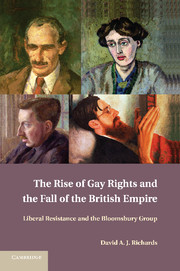 The Rise of Gay Rights and the Fall of the British Empire
The Rise of Gay Rights and the Fall of the British Empire 4 - The Fall of Empire
Published online by Cambridge University Press: 05 June 2014
Summary
The connection between the rise of gay rights to the fall of empire must be discussed in two stages. First, there is the period running from the rise of gay rights to World War II up to the 1967 decriminalization of gay sex in Great Britain. Second, there is the period after the 1967 decriminalization. I divide the discussion in this way because the concept of gay rights, as I explored in some depth in Chapter 3, came alive and became the subject of creative public work under the radar of repressive British censorship and the criminal penalties for gay sex that had destroyed the life of Oscar Wilde. Much of that work, as we have seen, questioned and criticized, either explicitly or implicitly, British imperialism, including not only resistance to service in World War I, but British imperialism itself after the war. We can see its impact during this period in the growing debate within Britain about giving up the Raj in India, the Jewel in the Crown of the British Empire, together with the impact Gandhi's activism increasingly had on British public opinion, much to Winston Churchill's furious objection to this “seditious Middle Temple lawyer, now posing as a fakir of a type well known in the East.” (Britain, after delaying much too long, rather precipitously gave India its freedom in 1947.) Further evidence is seen in the willingness of Britain finally to free Ireland from colonial rule in 1922 (Gladstone's 1885 proposal of Irish Home Rule had earlier failed). But because gay rights during this period was not yet on the public stage, its impact on British ethics and politics was not yet publicly known and discussed. For example, the leading biography of John Maynard Keynes by Roy Harrod, published in 1951, contained no discussion at all of the long, decisively important period of his living and loving as a gay man.
- Type
- Chapter
- Information
- The Rise of Gay Rights and the Fall of the British EmpireLiberal Resistance and the Bloomsbury Group, pp. 140 - 207Publisher: Cambridge University PressPrint publication year: 2013


